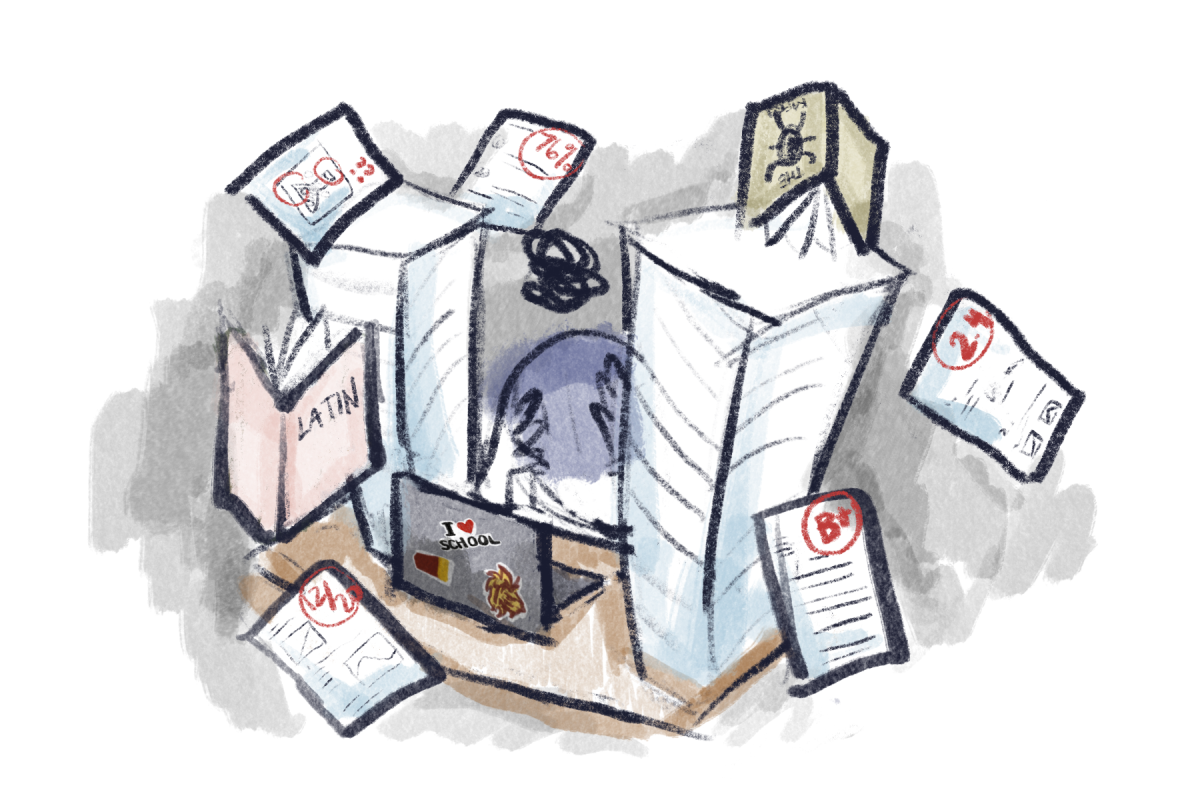Yes
Nami G. ’28
As the grueling gap between the Thanksgiving and Winter breaks comes to a close, students are noticing an increased amount of homework as teachers try to cram new information in before the next semester. As a result, students are starting to feel more stressed and less rested when they should, instead, be excited about their upcoming break.
Lakeside students often juggle extracurricular activities on top of schoolwork, meaning they have less time to complete homework, do their activities, and eat dinner. As a result, their work can cut into sleep time. We all have seen or even experienced Lakeside sleep habits. As we all learned in our 9th grade HD (formerly known as Wellness) classes, students need 8-10 hours to be fully rested — which is likely why Lakeside students can often assume the appearance of being passed out by fifth period. Obviously, if you’re fighting to stay awake in class you won’t be paying attention to anything that’s being taught. “I have only been sleeping for four hours for the past three months,” Stephanie W. ’28 explains, “Because I go to sleep at 1 a.m. and had to wake up at 5 a.m. for swim.” However, with a reduced homework load students would be able to get more sleep and come to school refreshed and excited to learn. Though homework does reinforce learning of concepts, it’s difficult to retain information when your eyes are peeled open at 2 a.m. as you struggle to finish an assignment — only to fall asleep in class the next day and not learn anything.
Sometimes, the homework isn’t even needed. ‘Busy work’ refers to the type of homework that consists of just completing activities without meaningfully contributing to learning. “It’s just so overbearing and it’s never coordinated so some days I have a lot of homework and some days I have nothing at all,” explains Chelsea W. ’28, “Around three out of six of my classes have busy work.”
Additionally, more homework means that there’s less time to spend on hobbies or things that you’re passionate about. “There’s a lot of things I want to do that I don’t have time for because I’m busy all the time. Because of both homework and extracurriculars, it’s prevented me from doing something I actually enjoy,” Chelsea says.
Overall, homework has been contributing to the “pressure cooker” environment that Lakeside is infamous for hosting. A reduced homework load would not only relieve stress off of students but would enable better sleep habits and the equally essential pursuit of hobbies.
No
Natalie G. ’28
As end-of-unit projects and assessments flood in, students up and down the halls are talking about the increased homework load. So yes, people are starting to feel more stressed and sleep less, but the problem as a whole isn’t that Lakesiders have too much homework over the course of a year. At its root, it’s a result of everything being crammed into a small period of time, typically right before breaks when teachers are prohibited from assigning homework or before the quarter ends in hopes of tying loose ends.
No matter how annoying you think homework is, it still serves an important purpose. Homework is crucial in our learning process; it helps us reinforce the knowledge we learned in class, gives us time to process it, and acts as a great resource for upcoming tests and projects.
Lakeside’s academic rigor is designed to help students develop grit and successful habits. However, when too much homework is piled onto your plate from all classes, it can suddenly feel unsurmountable.
Other than this mountain of increased work, there is another factor that contributes to overall stress and dissatisfaction — procrastination. Lakesiders — and all students in general — have tendencies to procrastinate on homework or studying. When everything is due on one day, we tend to put things off because playing video games or going on social media is more appealing than starting on the homework due four days later. One anonymous freshman agrees, saying, “I was basically on my phone all night yesterday even though I have like three tests later this week.” And one anonymous sophomore wrote in Tatler’s monthly polls, “I feel like Lakesiders need to get our act together about homework efficiency.”
As for “busy-work,” which refers to homework that doesn’t contribute to overall learning, teachers try their best to not assign it — after all, what’s the point of wasting time grading something trivial? English, for example, is widely thought by students to be a bit of a hassle regarding annotations and pacing. However, Ms. Salah, an English teacher, disagrees that homework is just busy-work, saying, “The reading not only allows you to take part in discussions in the classroom but it’ll also open up your world a little bit more.” Math, a course known for its endless worksheets and problem sets, has homework that is “effectively optional,” as one anonymous senior notes, “but will definitely help you raise your test grades.” All in all, if any homework assignment is too repetitive or is being dubbed as “busy-work,” always remember that “repetition is the key to security,” and putting in the work will definitely benefit you in the long run.
Despite the benefits of homework, as a student who also suffers from procrastination and stress, I have to admit that Lakeside’s current homework system is not going to cut it. By staggering deadlines instead of cramming all assignments into one block of time, Lakeside would be killing three birds with one stone — students would have a better school-life balance to accommodate for extracurriculars and their “rigorous Brawl Stars schedules,” students would be more time-efficient without giving up important downtime and sleep, and the curriculum’s overall rigor and knowledge would remain untouched. Meanwhile, by reducing the homework load and continuing to function on squeezing big projects into a small window, students will still find it difficult to adapt to the sudden shift in volume during these crucial times, exacerbating the situation while losing out on parts of the learning process




